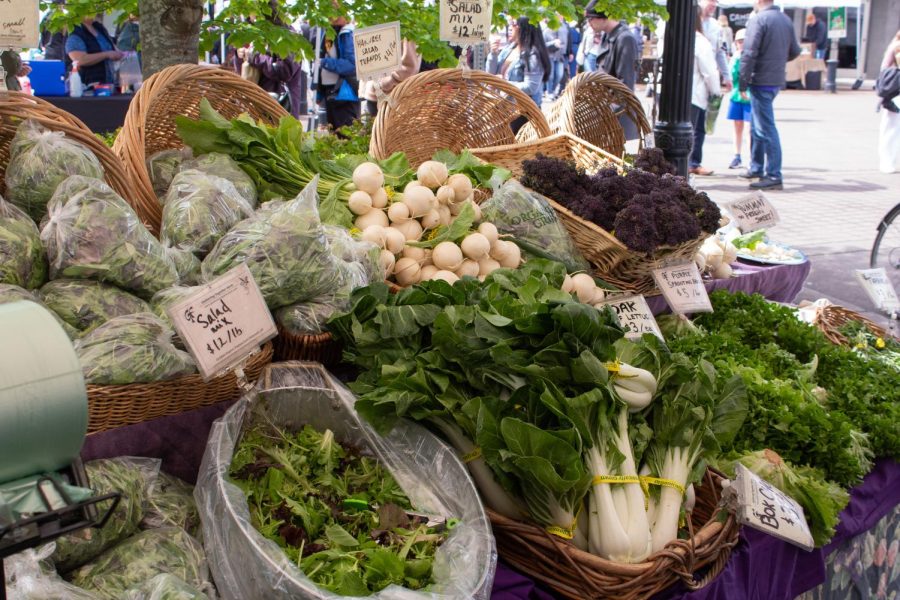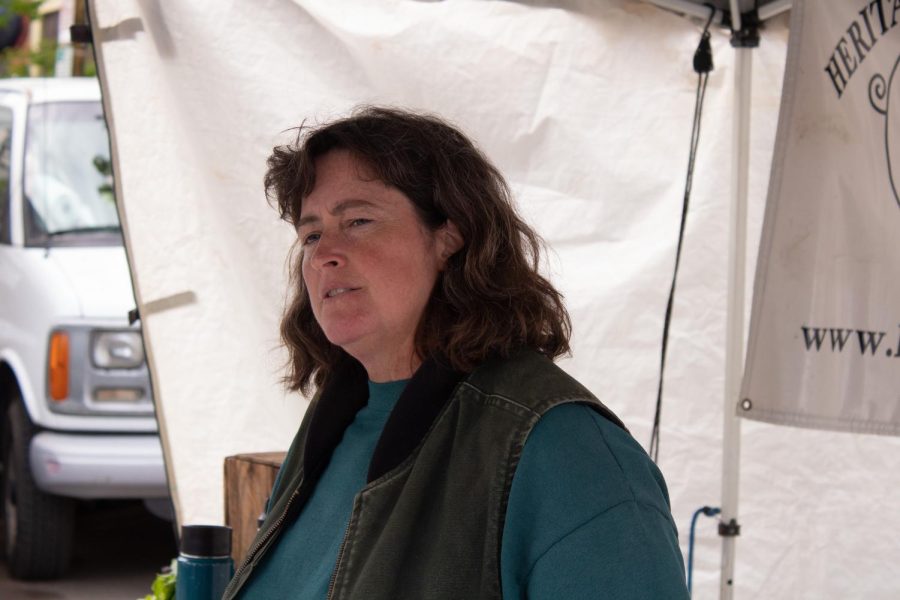Cold and wet spring has delayed harvests, Corvallis growers say
Vegetables offered for sale by Gathering Together Farm at the Corvallis Farmers’ Market on May 6 in downtown Corvallis. As with most of the farms at the Farmers’ Market, Gathering Together Farm felt little to no negative effect from the past year’s weather trends.
May 18, 2023
If you were wondering why certain commodities like salad mix weren’t present during the first part of spring at the Corvallis market, it’s because of the cold weather, and Corvallis growers felt it.
For the farmers at the Corvallis Farmer’s Market, the weather these last few months has created a slow start, according to Alexandra Schaffer, a farmer at Lucky Crow Farm. The transition from winter to spring was described as “cold and wet” by Wendy Parker, a farmer at Heritage Farm Northwest. This specific type of weather can make it difficult for farmers to plant their crops.
“You need weather dry enough to be able to dry out the soil so you get on the field and plant some crops, but once you go out and plant it, then you would like plenty of rain again,” said Paul Harcombe, a farmer at Harcombe Farm.
A cold and wet spring can affect what growers are able to nurture and sell during the farmers market. Many can run into an issue where their most sought after item isn’t growing or can’t be planted, and therefore can’t be sold.
“The first few weeks (of spring) here we didn’t have our salad mix, which is one of our most popular things because it was just too cold to get stuff in the ground,” Schaffer said.
These last few months have consisted mostly of rain and a lack of sunlight, creating issues for many farmers. According to Weather Underground, the Salem Municipal State/McNary Field Station reported an average temperature of 41.9 F in March. The website also shows that there were a total of 10 days with zero precipitation during this time.
“So much of farming is just year to year (uncertainty) of what the climate is going to be like,” Schaffer said
These trends of these colder and more wet springs are consistent with what farmers have been experiencing last year according to Rosey Allende, a farmer at Gathering Together Farm. Allende said that this weather trend is something that her farm needs to adjust to.
James Cassidy, senior instructor of crop and soil science at Oregon State University, said while Pinot Noir grapes do grow well in this climate, if the extremes of the climate increase, they will probably suffer.
“There are some farmers who are hedging their bets and planting more hot weather grapes,” Cassidy said.
When plans go awry, these local growers have contingency plans to make sure that they are able to maintain a crop yield through these harsh weather conditions.
“Growing a wide range of diverse crops allows us to hedge our bets in an increasingly unpredictable climate.” Cassidy said. “Some things always do great, some things always fail, and the rest is somewhere in between but we can’t always predict what crops will occupy those categories.”
There are some crops that enjoy this colder environment. Additionally, there are some animals that enjoy this colder weather.
Parker, whose farming focuses more on pigs, said “Most of the grown hogs are fine. They love colder weather and the wet weather and they think that’s just perfectly great. However, piglets that we just had born are cold, y’know, everything’s cold.”
Anyone who would like to support these and many other farmers can visit them at the Corvallis Farmers Market on Wednesdays and Saturdays at 9 a.m to 1p.m.



















































































![Newspaper clipping from February 25, 1970 in the Daily Barometer showing an article written by Bob Allen, past Barometer Editor. This article was written to spotlight both the student body’s lack of participation with student government at the time in conjunction with their class representatives response. [It’s important to note ASOSU was not structured identically to today’s standards, likely having a president on behalf of each class work together as one entity as opposed to one president representing all classes.]](https://dailybaro.orangemedianetwork.com/wp-content/uploads/2025/03/Screenshot-2025-03-12-1.00.42-PM-e1741811160853.png)

























